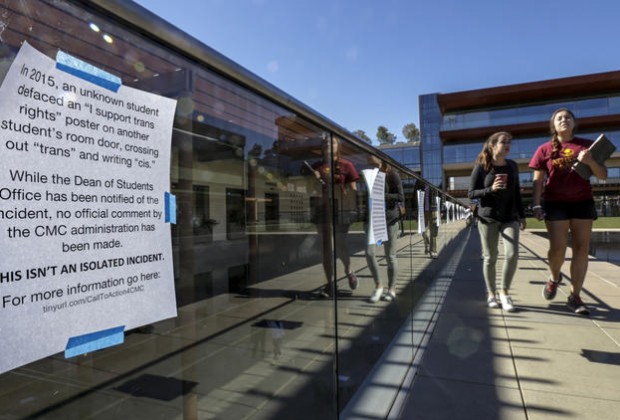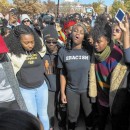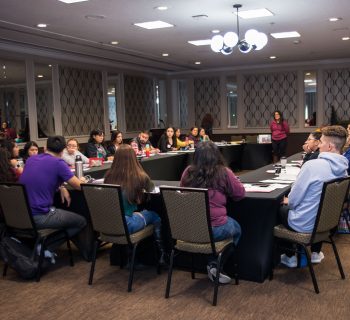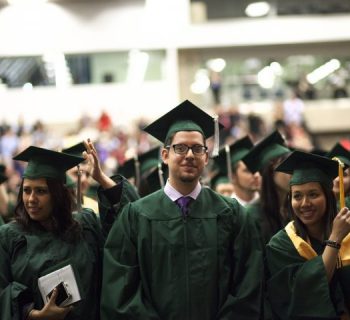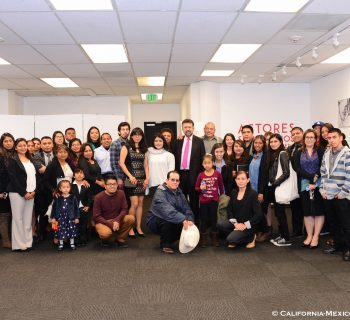By Teresa Watanabe and Larry Gordon, L.A. Times ~ November 14, 2015
Student leaders at Claremont McKenna College on Friday savored their victory at the departure of a high-ranked administrator deemed insensitive to minorities and won promises that the liberal arts school would seek to add more diversity among faculty and staff.
Their win, after protest rallies and two students' hunger strikes, was particularly relished at a school that has been traditionally more politically conservative than many other colleges around California. For some older alumni, “CMC” was seen as a jumping-off place into Republican political careers and business success, not a campus hosting the activism more often seen at UC Berkeley or UC Santa Cruz.

“It's incredibly surprising that this is something students of marginalized identities have been able to do on our own,” said Jincy Varughese, a senior who helped start the CMCers of Color activist group this year. “Before, the message in the classroom and dorm rooms was that we were not empowered,” said Varughese, who was born in India and raised in Houston.
The campus, roiled by student protests earlier this week, was quiet Friday as students in shorts and T-shirts soaked up the sun, chatted and read books. Few seemed to take notice of the many unsigned fliers taped to buildings, windows and even toilet stalls describing acts of bias experienced at Claremont. They included vandalism at the Queer Resource Center, defacement of Black Lives Matter posters, racial slurs and perceived mockery of their cultures.
Their protests came to a head Thursday with the resignation of Dean of Students Mary Spellman, who had angered students with her email to a Latina student saying she would work to serve those who “don't fit our CMC mold.” Spellman later apologized. Her remarks galvanized minority students who said they have long sought more funding for multicultural services and other changes, although not all the student activist groups called for her resignation.
In the wake of the protest, campus president Hiram Chodosh announced a package of reforms aimed at increasing diversity, adding staff to better mentor students from various backgrounds and setting aside a physical space where issues of inclusivity, civil rights and free speech can be discussed.
Protest leaders said Friday they would press to make sure the promises are actually kept and push for more, such as a requirement for a course on diversity.
“We're hopeful but wary,” said Aaron McKinney, 20, a physics and psychology major who co-leads an African American campus group.
Chodosh said in an interview Friday that many of the changes he announced after this week's protest had been previously under consideration and that he regretted that the school had not moved faster. He said the protests “accelerated” the reforms.
Chodosh said he felt “tremendous sorrow for the slow changes in every part of my life, in every part of our community,” in the same way he feels sorrow for economic inequities in American society.
The campus president said it would be wrong to blame the furor just on Spellman's email comment. “It is more important to focus on the underlying dynamics and to realize the challenges the students are bringing to everyone's attention are societal challenges and national challenges and we have our own iterations on our campus. It's not a single email. It's a shared collective responsibility,” he said.
Chodosh also pledged to work to maintain free speech on campus from all sides. He noted that Claremont McKenna appears to have more conservative and middle-of-the-road faculty and students than some other colleges around the country. “I think we have an extremely beneficial political balance in our college. And we cherish the political diversity on our faculty, which is sadly lacking in other institutions.”
This week's political activism at Claremont McKenna College may jolt some alumni who recall it as the most politically conservative and business-oriented of the seven schools at the Claremont Colleges consortium. In fact, in 1999, when the college hired former Duke law school dean Pamela Brooks Gann as president, the buzz was less about her being the first woman leader at the campus and more about her having leanings toward the Democratic Party.
Claremont McKenna's reputation in the past as a more conservative school than its neighbors comes in part from some prominent alumni, including former Republican Rep.David Dreier and Rob Hurtt, the former state Senate Republican leader.
The school was founded in 1946 as Claremont Men's College, primarily for World War II veterans who had tuition paid through the G.I. Bill. It was meant in part as an enrollment counterweight to the older Scripps College next door, which remains a women's school today. “CMC” went co-ed in 1976 and changed its name five years later to Claremont McKenna in honor of industrialist Donald McKenna, who was a major donor. While the world “men's” was gone from the college, people still were able to maintain the nickname “CMC.”
Kaylilani Minami, 20, said the student activism has already begun to change the campus climate. In a recent government class, the professor announced she would deviate from her syllabus for the first time in 16 years and allow students to discuss the race issues that have roiled the campus. Minami, a junior, said several white students asked how they could be allies and said they had never been conscious before of how marginalized some students felt.
“The response was really great,” she said.
Minami said she realized the need for more campus resources for minority students in her freshman year. A government professor, talking about how Capt. James Cook was killed by native Hawaiians, joked that it was not the paradise then that it is now, spurring laughter in the class.
But Minami, of Hawaiian descent, said she was stung by the insensitivity to how Cook and other whites had savaged her people and homeland. “It was horrible,” she said. “I felt so isolated, like my identity was being diminished and my whole culture and ancestors' struggles were just a joke.”
Experts said protests at CMC are part of a wider trend that started with the Black Lives Matter movement and was brought to wide attention at the University of Missouri, where the football team's threat to strike unless racism was addressed there led to the resignation of two top leaders.
“I do think this is a national trend. There is a new kind of activism that is really calling to us,” said Miriam Feldblum, Pomona College's vice president and dean of students.
“There is no doubt that students of color, black students are facing the realities and legacies of institutional racism on and off campus. And it's really important for colleges and universities to grapple with this,” Feldblum said.
The Claremont McKenna protesters said most of their fellow students have been supportive but anonymous posters on the Yik Yak social media site have accused them of trying to foment a race war or tried to silence them.
Michaiah Young, a sophomore majoring in economics and neuroscience, said they are not aiming to stir up conflict but to facilitate more open conversations about race, gender and identity, as touchy as that may be. “We all need to listen to each other,” Young said.
She and McKinney said they mainly love their college experience, despite some culture shock at leaving heavily minority high schools for the more heavily white, affluent Claremont. They are active in such campus pursuits as Bible study, skateboarding and pole vaulting.
“This place is my paradise but it hurts to know there are students here who found a different experience,” McKinney said.
Andrew Meehan, a management engineering major, said he was startled by the speed of events that led to Spellman's resignation. But he said he supported the students.
“CMC is often stereotyped as West Coast Wall Street students,” said Meehan, who is white. “It draws a more conservative student with wealthier backgrounds. The structure of the school's hierarchy is mostly white males all the way to the board of trustees. If you look at the board it's mostly rich white guys. So from the top they're not much aware of the issues people of color are facing.”
Meehan described himself as an affluent student whose father is a financial adviser and mother, a yoga teacher. But he said he supported the minority students in part because he was raised in Birmingham, Ala., and was steeped in the city's significance in the civil rights movement. Speaking of Claremont minority students, he said, “If I had the issues they did, I would be outraged and they have the same right to be outraged too.”
How racial tensions boiled over at Claremont McKenna College
The Princeton Review recently ranked Claremont McKenna College as #3 on the list of schools with the happiest students.
But over the last few months, the elite liberal college has been roiled by protests capped Thursday by the resignation of its dean.
Dean Mary Spellman stepped down after campus protests and hunger strikes by two students this week over her email to a Latina student saying she would work to serve those who “don’t fit our CMC mold.”
But the protests were about more than those five words.
What were students' complaints?
Months of complaints boiled over this week with protests and a hunger strike. Beyond Spellman's comments, students complained that the administration has ignored their concerns over a lack of diversity, demands for a resource center for students and what some claim is "institutional racism" across the campus.
Get the essential California headlines delivered free >>
In a YouTube video posted Wednesday, protesting students outlined their concerns about what was going on at Claremont McKenna. Some said they felt professors didn't respect their identity and others said they didn't feel safe on campus.
One protester called for a more diverse range of courses focusing on issues such as social justice and community activism.
The students also said they wanted to be part of the process for hiring new faculty and staff.
In later video from the protest, both Spellman and Claremont McKenna President Hiram Chodosh spoke to the students. Spellman apologized and tried to explain her choice of words.
Here's another video from an earlier protest.
What has been a rallying point for students?
Many protesters pointed to an article written by a Latina student, Lisette Espinosa, who described her struggles on campus:
Whose voices are the loudest on campus? Whose voices are kept at the margins? Who do we look to for knowledge, and whose knowledge is valued? Are our "success" and "leadership" measured in dollar signs? What role do the colleges play in replicating inequality while touting "responsible leadership"? Who is respected, and who is not given a living wage? Whose life is given priority, and whose lives are criminalized, jailed, detained and disposable? What stereotypes and ideologies do we allow in our lives that contribute to the normalization of structural inequality and social suffering?
What did Mary Spellman say when she resigned?
She said she felt "sadness beyond words" over he decision to step down.
Here is her full letter to the campus:
Dear CMC Community:
Since 2010 I have been privileged to serve as Dean of Students at Claremont McKenna College. Today I am submitting my letter of resignation, effective immediately. I do so with sadness beyond words, because these nearly six years have been the most rewarding and fulfilling of my life, but also with the conviction that it is the right thing to do for the school and the students I care about so deeply.
I have been grateful for the support of the Administration and the heartening encouragement I have received from so many of my students, former students and colleagues. Among the calls, texts and emails I have received is a student who wrote:
“You’ve inspired me in my time at CMC. Please stay strong and realize students like me need you to stay here … I will always be honored to consider you a mentor, a role model, and above all, friend.”
And a faculty member who wrote:
“I also recognize how much you have worked to make our community more inclusive … I know I join many fellow faculty members and students in expressing my full support and confidence in you as Dean of Students here at CMC.”
To all who have been so supportive, please know how sorry I am if my decision disappoints you. I believe it is the best way to gain closure of a controversy that has divided the student body and disrupted the mission of this fine institution. Most important, I hope this will help enable a truly thoughtful, civil and productive discussion about the very real issues of diversity and inclusion facing Claremont McKenna, higher education and other institutions across our society.
How have protesters reacted to Spellman's resignation?
Taylor Lemmons, one of two Claremont student who began a hunger strike this week to draw attention to the demands for Spellman’s resignation, told supporters Thursday: “Let this be a message to anyone who sees a wrong and speaks out to make it right. You can do it. All you have to do is speak up, be strong in your convictions and never give up.”
Others took a different view. In the Forum, the school paper, student Jessica Jin wrote:
I, myself, see Mary Spellman’s resignation as more of a ceremonial sacrifice than a significant step toward substantive change on the issue of race at CMC. I’m not interested in contesting the justification or merits of her resignation. Whether or not she truly was unfit to serve as Dean of Students due to implicit racial bias is a debate that, though important, is beyond the scope of what I see as the real issue at hand. To be distracted by her departure is to take the easy route out by debating extraneous consequences rather than contemplating our own actions and behavior. Dean Spellman has very little bearing on the individual experiences that shape our time at CMC.
What is the university doing?
Chodosh announced that new leadership positions on diversity and inclusion would be created in the offices of academic and student affairs. The administrators will work to increase diversity in hiring and in the curriculum, and a new space will be dedicated for work on diversity, identity and free speech, he said in a letter to the campus community.
“I stand by our students,” Chodosh wrote. “I support their right to speak out forcefully, and want their voices to be heard.”
What is Claremont McKenna?
Claremont McKenna is often ranked among America's top liberal arts colleges.
See the most-read stories this hour >>
Claremont McKenna is part of a consortium of seven campuses that make up the Claremont Colleges and includes Pomona College, Scripps, Harvey Mudd and Pitzer College.
Noted for its highly selective admissions, Claremont McKenna tied with Vassar College as the nation's 10th-best liberal arts college in U.S. News & World Report's 2013 rankings. The campus enrolls about 1,250 students; annual tuition and fees top $44,000.

